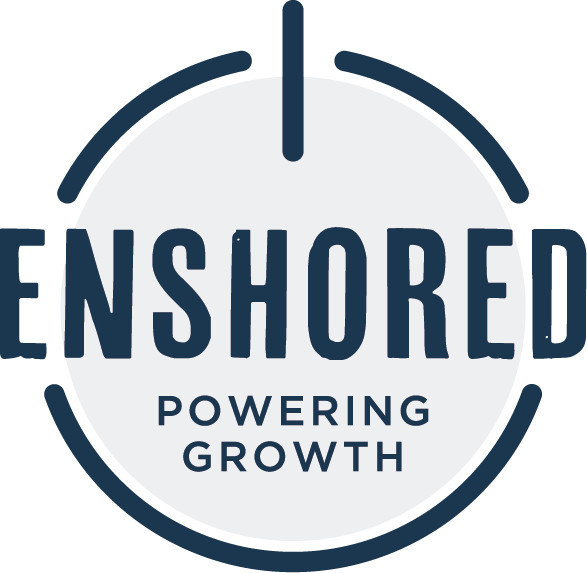Taking too long? Close loading screen.


Are you facing mounting pressure to do more with less? Is your team stretched thin, trying to balance core tasks with back-office demands that never seem to stop?
If so, you’re not alone — today’s business landscape is complex, rapidly evolving, and ultimately unforgiving when it comes to inefficiencies.
At Enshored, we’ve worked with companies across a wide range of industries that were once in your shoes — overwhelmed by the daily grind and seeking ways to improve their bottom line without sacrificing quality.
By outsourcing key business processes like data entry, customer service, payroll, project management tasks (and more) to us , those companies have been able to tap into expert resources around the clock and around the world while reducing costs, eliminating backlogs, and scaling much more quickly.
In this article, we’ll demystify what business process outsourcing (BPO) is and provide examples of companies that have successfully outsourced these kinds of tasks to streamline operations, reduce overhead, and ultimately supercharge their business growth.
According to recent data, the global BPO market is expected to grow at an annual rate of 6.48%, reaching $450 billion by 2027. This surge is driven by companies across various industries that have turned to outsourcing to increase efficiency, expand operations, and scale quickly.
A significant factor behind this trend is the focus on cost savings and access to specialized skills. In fact, 59% of companies cite cost reduction as their primary reason for outsourcing, while 49% emphasize the importance of gaining new capabilities.
To add context to this data, let’s explore exactly what BPO is and how it works for businesses like yours.
Business process outsourcing (BPO) is when a company hires outside organizations to handle tasks that it could otherwise manage internally.
This includes functions like customer service, human resources, content moderation, accounting, data entry, sales and marketing, back office support, or software development.
Outsourcing administrative tasks allows a business to focus on its main business functions, or core activities, enhancing in-house management and employee efforts.
Companies often outsource these processes overseas, taking advantage of lower labor costs in different countries, but it can also occur locally. Whether a small startup or a large corporation, organizations can leverage a trusted BPO partner to streamline operations to focus efforts toward improving productivity, ultimately leading to better customer service.
Understanding the different buckets of business process outsourcing (BPO) can point you in the right direction as you begin your search for an outsourcing partner. We’ve compiled a list to help you identify potential areas for growth and choose the right bucket for your needs, budget, and culture.
Front-Office BPO involves customer-facing functions. These can include customer satisfaction, sales, and marketing. This type of business process outsourcing focuses on enhancing customer interaction, experience, and retention.
Back-Office BPO includes internal business functions that usually fall behind the curtain (such as accounting, payment processing, and data entry). This type of outsourcing improves the efficiency of core operations by allowing outside experts to manage non-core activities.
Off-Shore Outsourcing contracts services to BPO firms outside of a business’ own country. Common off-shore outsourced functions include IT services, customer call centers, and manufacturing.
Near-Shore Outsourcing or Domestic Outsourcing means working with firms based in neighboring countries. This may reduce cultural barriers and allow closer collaboration between the partners while maintaining a wide net for expertise within a larger, more accessible locale.
On-Shore Outsourcing firms offer BPO services within your country. This type may be preferred for compliance, communication, and quality control standards. Firms within your locale may align with your perspectives and be familiar with your regulations.
Each type of BPO helps businesses focus on core competencies while leveraging external expertise for other functions.
Companies across industries choose business process outsourcing for several key reasons:
1. Cost Savings: Smaller companies often rely on a third-party company to reduce operational costs, as outsourcing can be more economical than maintaining in-house staff.
Example: Contracting a call center instead of building and managing one in-house.
2. Focus on Core Activities: Medium-sized businesses can streamline their operations by outsourcing non-core functions, allowing them to concentrate their on-site employees’ efforts on strategic growth and core competencies. This ensures business objectives can be met with ideal operational costs.
Example: Focusing on product development and sales instead of spending unavailable time or talent on back-office tasks like data entry by outsourcing those activities to BPO agencies.
3. Access to Expertise: Outsourcing opens up a whole new world of talent for companies to reap benefits from — literally. You’re not limited to talent by location unless you want to be. A global workforce can jumpstart company processes and add valuable insight. Industry experts at firms worldwide have specialized knowledge and skills, top-quality services, and high-quality support.
Example: Outsourcing to an external service provider in the manufacturing industry reduces time training and hiring for skills with repetitive tasks. This reduces operating costs and makes room for investing in cutting-edge technology and specialist in-house talent.
4. Scalability: Outsourcing certain operations and areas of expertise can help you scale your business even in a fluctuating market. In fact, when partnering with the right BPO provider, you can scale up or scale down as necessary with minimal-to-no lift on your part. Stay flexible, adjusting workloads as needed according to market demands without the burden of hiring or layoffs in unprecedented times.
Example: Law firms, accounting firms, and businesses small and large can relieve the pressure of managing payroll management, customer service, financial reporting, and data entry by working with BPO providers that can easily and almost instantly onboard these experts.
5. Risk Management: An external service provider should prioritize security. They should mitigate risks associated with compliance and data security. Experienced BPO professionals are skilled at identifying areas of opportunity and implementing best practices to improve operations moving forward.
Example: Experienced BPOs like Enshored prioritize compliance with the ever-evolving regulatory requirements and restrictions of the clients and industries we serve. The right BPO partner should also maintain any key certifications that apply to your industry, such as HIPAA or Soc 2 compliance.
6. Innovation: By choosing to outsource, companies can leverage advanced technologies and innovative solutions from third-party experts, fostering ongoing growth and competitiveness.
Example: When a company chooses to outsource its IT support to a BPO provider — instead of struggling with outdated systems or investing heavily in expensive in-house solutions — they can tap into the provider’s advanced tools, like AI-driven analytics or automated customer support.
Companies continue to choose Enshored as their BPO partner due to our ability to deliver significant efficiency gains and cost savings through tailored automation and customer support solutions from around the world.
Headquartered in Southern California, with additional outsourcing hubs in the Philippines and Portugal, Enshored helps your company gear up for growth while removing the hurdles that businesses like yours face worldwide.
With a proven track record serving midsize and enterprise clients across industries, Enshored is also ideal for startups in disruptive sectors and our services can be customized to meet any business need.
For example, as the BPO for a FinTech firm, Enshored implemented a strategy combining web scraping and backend automation across multiple projects. This approach not only improved data quality and streamlined operations for the client but also led to substantial cost savings that exceeded $2 million.
By automating repetitive tasks and enhancing operational efficiency, Enshored empowered the FinTech firm to deliver high-quality client service without disruptions, reinforcing our value as a reliable BPO partner.
Similarly, while serving a client in the travel sector, our team demonstrated its ability to streamline back-office and customer service operations while exceeding client expectations.
By managing essential tasks such as data entry, account updates, and payment processing, Enshored enabled the travel company client to achieve over 90% of its service-level agreements (SLAs) — all while providing around-the-clock customer support.
Essentially, Enshored’s ability to work autonomously for the clients we serve while delivering practical, customer-centric solutions has made our team a trusted partner for businesses looking to enhance operational efficiency and maintain high levels of client satisfaction. We organize and optimize all your outsourcing needs in one place.
Choosing the right business process outsourcing provider is critical for your business’s success.
Here are some key guidelines to consider:
1. Define Your Requirements: Clearly outline the specific functions you want a third-party provider to manage, such as customer service, digital marketing, social media marketing, IT support, payroll processing, or data entry. Research consulting firms that offer these services and take note of their reach and how they might fit into your expectations.
2. Evaluate Experience: Look for BPO providers with a proven track record in your industry. Request case studies and client testimonials to assess expertise.
3. Assess Technological Capabilities: Ensure the provider has up-to-date technology and tools that seamlessly integrate with your systems.
4. Consider Scalability: Choose a BPO that can grow with your business and that is equipped to scale services according to the fluctuating demands of your business and the market fluctuations that could affect operations. Be realistic about growth projections and prepare for a variety of situations.
5. Examine Security Practices: Verify that the provider has robust security measures in place to protect your sensitive data. Train internally on security best practices and thoroughly audit operations before and throughout the contract.
6. Analyze Cost Structures: Compare pricing models and ensure transparency with no hidden fees.
7. Communicate and Find a Cultural Fit: Evaluate communication style and responsiveness to ensure a harmonious partnership.
To determine the success of a business process outsourcing (BPO) partner, analyze key performance indicators (KPIs) such as the following factors:
Regular performance reviews with the BPO provider can ensure it meets established benchmarks and aligns with your goals. Additionally, gathering feedback from internal teams and users can provide insights into the effectiveness and efficiency of the services rendered.
It is also essential to assess the BPO provider’s ability to adapt to changing business needs and its commitment to continuous improvement.
A successful partnership is often reflected in enhanced operational efficiency, reduced overhead costs, and an overall positive impact on your company’s bottom line.
Monitoring compliance with service level agreements (SLAs) and resolving issues proactively will further indicate the provider’s reliability and alignment with your organization.
Ultimately, a successful BPO relationship should improve performance metrics and contribute to your company’s strategic vision.
What is business process outsourcing (BPO)?
Business process outsourcing (BPO) refers to contracting specific business operations to third-party service providers like Enshored. It allows companies to focus on core tasks while outsourcing processes like customer support, data entry, or HR functions that can result in costly errors or backlogs.
Why do businesses choose to outsource?
Businesses of all sizes choose to outsource to trusted BPO providers in order to improve efficiency, reduce operational costs, and access specialized expertise. Essentially, outsourcing is a proven business strategy for growth and scalability without overextending internal teams.
What kinds of tasks can be outsourced?
From customer service to payroll processing, back-office task management, IT support, and content moderation — any repetitive, remote and/or non-core task can be handled by a BPO partner.
Is outsourcing only a fit for large companies?
Not at all. Small and mid-sized businesses are increasingly turning to BPO partners for affordable ways to optimize operations, scale their company, compete with larger players, save on costs, and access 24/7 expertise for niche aspects of their businesses.
Anticipating growth?
Access the tools, tech & team you need to scale globally.

Serious about scaling?
One call is all it takes to know if we’re a fit.
© 2024 Enshored · Privacy · GDPR · California · Cookies · Marketing by Klicker